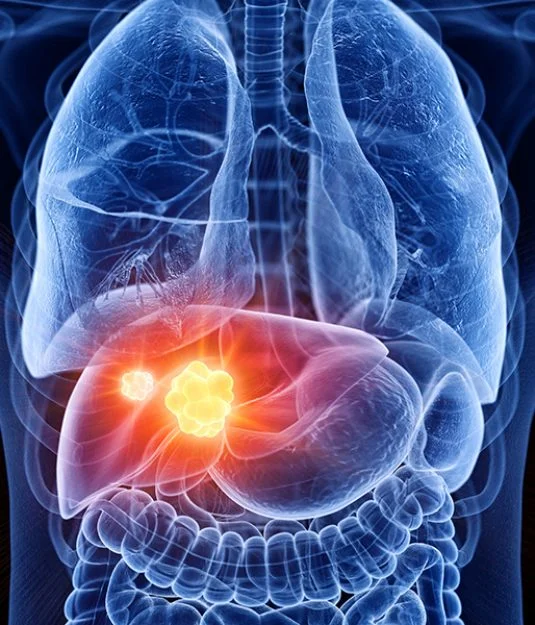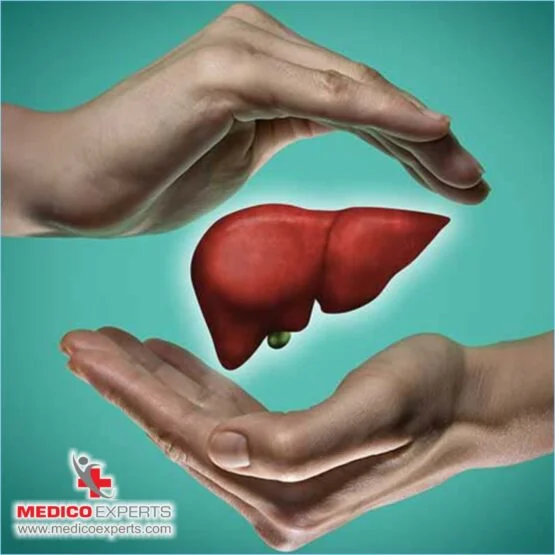Liver Cancer Treatment in India: Best Options & Success Rates
Looking for the Best Liver Cancer Treatment in India?
Liver cancer can be a challenging condition, requiring precise diagnosis and an expert medical team for the best possible treatment.
However, advancements in cancer care, surgical techniques, and innovative therapies have significantly improved liver cancer survival rates in India.
If you or your loved one is searching for affordable, high-quality liver cancer treatment in India, this guide provides comprehensive details on available treatments, success rates, costs, and expert advice. Let’s starts with treatment journey.
Mr. Riyaz’s Liver Cancer Treatment Journey
Let us know what Mr. Riyaz from Nigeria tells you about his liver cancer treatment journey.
“Medicoexperts is a very dependable organization that helped me cure my liver cancer and brought fresh hopes back to my life. It helped me make the right decision of surgery at the right time through its multidisciplinary tumor board approach”

Before moving forward, let’s first understand what the Liver is and why it’s so essential for the body.
What is the Liver and its primary functions?
- The liver tissue metabolizes the toxic materials that are found in your body.
- The liver organ secretes semi-fluid greenish-yellow bile and it plays a major role in digestion and absorption of fats.Bile by-products on the other hand are secreted in the intestine and are later on excreted from your body through feces hence it is involved in the elimination of waste material in the body.
- The liver controls all chemical levels in your body specifically in the blood.

What is Liver Cancer?
Liver cancer begins with the cells of the Liver.
Many types of cancer can form in the Liver. Amongst Liver cancers, the most prevalent one is hepatocellular carcinoma.
We should understand the triggers of Liver cancer.
What are the Different Stages of Liver Cancer?
Liver cancer stages are denoted by numbers that range between 0 to 4:
The single primary tumor (any size) did not develop in your blood vessels. Cancer has not spread to your adjacent lymph nodes or remote sites.
Only one primary tumor (any size) has developed in your blood vessels, or several tumors are present (less than 5 cm). Cancer has not spread to your adjacent lymph nodes or remote sites.
This stage has two subcategories:
Stage 3A
Multiple tumors have been found with large size Cancer has not spread to your nearby lymph nodes or distant sites.
Stage 3B
Several tumors are found spreading to the vein of the liver. Liver cancer did not spread to your adjacent lymph nodes or distant sites.
Cancer may have spread to your neighbouring lymph nodes and or distant sites in the body. Advanced liver cancer does not metastasize frequently, but it is more likely to spread to your bones and lungs when it does.
In contrast to other cancers, liver cancer is complicated because most patients have damage that restricts the functioning of the organ. The liver provides an essential service to the body, helping with digestion and detoxification. Reduced liver function can lead to severe or fatal illnesses. Reduced liver function can also impact the choice of treatment options.
What are the Common Approaches Doctors Use to Treat Different Stages of Liver Cancer?
Once your doctor confirms the presence of cancerous cells in your liver, your doctor may prescribe you some medication to slow down the progression of cancer.
Also, before starting with the treatment your doctor may ask you to undergo a few tests to understand the location and extent of the spread of cancer in the liver.
Based on the spread of cancer, your doctor will choose the best treatment suitable for you. The different treatment approaches for different stages of liver cancer treatment in India are:
Usually, during the early stage of liver cancer, the cancer is localized and has not propagated anywhere else in the body. Therefore, to avoid further growth and spread of liver cancer, your doctor may advise you to remove the cancerous liver cells surgically.
Typically your surgeon uses laparoscopic or robotic surgery to remove the cancer cells from your liver.
During stage 2 liver cancer, there is an elevated chance for the transmission of cancer to neighbouring structures.
Generally, doctors use surgical intervention to remove the cancerous cells. Sometimes your doctor may advise a liver transplant to avoid the spread of cancer.
Some studies indicate that surgery followed by chemotherapy can increase the efficacy of the treatment.
Treatment for stage 3 liver cancer depends on various factors like the location of the cancer, the functioning of the liver, and the overall well-being of the person having liver cancer.
Based on the factors your doctor may suggest you chemoembolization, radiofrequency ablation, targeted or immunotherapy.
Unfortunately, the fourth stage of liver cancer is an advanced stage during which the treatment of cancer is not possible. However, doctors may try to relieve symptoms that affect the quality of life.
Sometimes your doctor may suggest targeted therapy or immunotherapy to destroy cancer cells to relieve symptoms to give you a good life.
Frequently Asked Questions (FAQs):
Q1. Can liver cancer be cured completely?
Liver cancer can be cured if diagnosed at an early stage. However, advanced-stage liver cancer cannot be cured completely, instead, the progression can be stopped to some extent. In case of remission or cure of early-stage liver cancer, it is important to visit the doctor regularly and take medication to prevent recurrence.
Q2. Can Stage 4 liver cancer be cured?
Stage 4 liver cancer particularly, Stage 4B spreads to the lungs and bones and it is not possible to treat cancer in multiple organs. This stage aims to give the patient relief from the symptoms. Such type of care is known as palliative care and it manages the feeling of pain, continuous nausea, respiration difficulties, etc.
Q3. Do liver cancer patients survive?
The 5-year survival rate is higher in patients who have localized liver cancer, that is the cancer has not spread anywhere. It is approximately 31%. The percentage survival rate of liver cancer that has spread to other segments of the liver, close by organs or lymph nodes differs in 5-year survival rate at 11 percent. When liver cancer has already metastasized or spread to other organs and tissues, the survival rate is just about 3% for 5 years.
Q4. What treatment options are available if my cancer has spread beyond the liver?
Targeted Therapy and Immunotherapy are the two options.
In addition, there are genetic alterations that make the targeted treatment more effective. Advanced liver cancer has many targeted therapies available in today’s world that are marketed by various pharmaceutical companies.
On the other hand, immunotherapy helps the immune cells that are capable of killing the tumors to remain in their optimal functioning without being hindered by the cancer cells.
Q5. Why does liver cancer develop?
There are different types of liver cancer but one can develop when the liver is in a condition called cirrhosis. The Hepatitis C virus is more at risk of causing liver cancer through cirrhosis, compared to the hepatitis B virus. Hepatitis can also be attributed to the effects of heavy alcohol consumption and liver cancer emerges in many cases.
Q6. Is liver cancer fast-growing?
Hepatocellular carcinoma often develops slowly and silently, unable to be detected in the early stages. However, if cancer has grown in the completely damaged liver, it may be detected in the course of diagnosis through a CT scan.
There is a type of liver cancer called angiosarcoma which is fast-growing, but often it can be surgically removed.
Q7. Can you live a normal life after liver cancer?
It’s good to be cancer-free after treatment but the disease can be reoccurring.
It is worth knowing that for many liver cancer patients, the disease may be recurrent, or it may continue showing signs even after treatment is administered. It is, however, possible for such people to undergo normal treatments which include chemotherapy, and radiation therapy besides other procedures that may help to regularly suppress cancer.
Once, your treatment is over, do not think that your cancer is completely cured. It is reasonable, therefore, to go for all your follow-up appointments.
Lastly, certain side effects of the treatment might endure for a long time or may appear sometime after the completion of your treatment.
Q8. What is the role of hepatitis B and C in liver cancer?
The main factors in the development of Hepatocellular carcinoma (HCC) are chronic hepatitis B and C viral infections. Like the other nonviral liver diseases, both acute and chronic HBV and HCV may lead to hepatic disease and even enhance fibrosis and cirrhosis of the liver.
Q9. What is the role of non-alcoholic fatty liver disease (NAFLD) in liver cancer?
NAFLD is present in one in four people globally, and according to trends, it might reach 30% of the population within the next few years. This disease can also advance to the next higher stage of Non-Alcoholic Steato Hepatitis (NASH) which carries the risk of cirrhosis and Hepatocellular Carcinoma (HCC).
Q10. What is the role of genetics in liver cancer?
People with siblings and parents having hepatocellular carcinoma are more prone to develop the disease. Along with this genetic factor, viral hepatitis can also play a role.
Q11. What is Deceased Donor Liver Transplant (DDLT)?
DDLT is mainly performed on brain-dead patients who are registered organ donors. Sometimes, their family members also decide to donate the organ. The liver can remain vital outside the body only for 12 hours. Therefore, immediately after the brain death of the donor, it is extracted and transplanted to the patient.
Q12. What is Cryoablation for liver cancer?
Cryoablation can be described as a surgical modality that makes use of cold to treat cancer.
In cryoablation, a thin instrument known as a cryoprobe, similar to a wand-like structure, is inserted into the body through the layers of skin. It means that the cryoprobe is inserted into the actual cancerous area of the body as a means of treatment. To all sides of the cryoprobe, there is a gas that is pumped into the area to freeze the tissue. Then the tissue is allowed to thaw. You note that the process of freezing and thawing is done consecutively several times.
It requires fewer invasions as compared to surgery and it is often used in cases where surgery for cancer cannot be used.
Q13. What is the irreversible electroporation technique in liver cancer treatment?
Irreversible electroporation is a technique of ablation that introduces short-range electrical pulses of DC voltage to create small pores in cells’ membranes, which interfere with homeostasis ( balance in intracellular and extracellular fluids) and cause cancer cell death.
Q14. When should I see a liver cancer specialist?
If you have white-coloured stool, jaundice, swelling in the abdomen, and weight loss, it is time to see a liver cancer specialist.
Q15. What are the available options for liver cancer treatment in India?
The liver cancer treatment in India includes surgery, liver transplantation, chemotherapy, targeted therapy, immunotherapy, and radiation therapy, depending on the stage of cancer.
Q16. Is liver cancer treatment in India affordable?
Yes, advanced liver cancer treatment in India at comparatively lower costs than many other countries, making it a preferred destination for medical treatment.
- https://www.ncbi.nlm.nih.gov/pmc/articles/PMC4132905/
- https://www.ncbi.nlm.nih.gov/pmc/articles/PMC2023919/
- https://www.ncbi.nlm.nih.gov/pmc/articles/PMC7052772/
- https://www.ncbi.nlm.nih.gov/pmc/articles/PMC7000212/
- https://www.ncbi.nlm.nih.gov/pmc/articles/PMC4674729/
- https://www.ncbi.nlm.nih.gov/pmc/articles/PMC9477084/
- https://www.ncbi.nlm.nih.gov/pmc/articles/PMC6505979/
- https://www.ncbi.nlm.nih.gov/pmc/articles/PMC2840947/
- https://www.ncbi.nlm.nih.gov/pmc/articles/PMC2517704/
- https://www.ncbi.nlm.nih.gov/pmc/articles/PMC6507546/
Next in Liver Cancer

Author Bio:
Dr. Yashashree Joshi – MBBS, MD (Philippines)
Dr. Yashashree Joshi, MD, is a globally-trained oncologist with a robust academic background and extensive experience in pioneering cancer treatments. Dedicated to patient-centered care, she continually integrates the latest advancements in oncology to provide her patients with innovative and personalized treatment plans.
Content Medically Reviewed By MedicoExperts Editorial & Clinically Review Board




